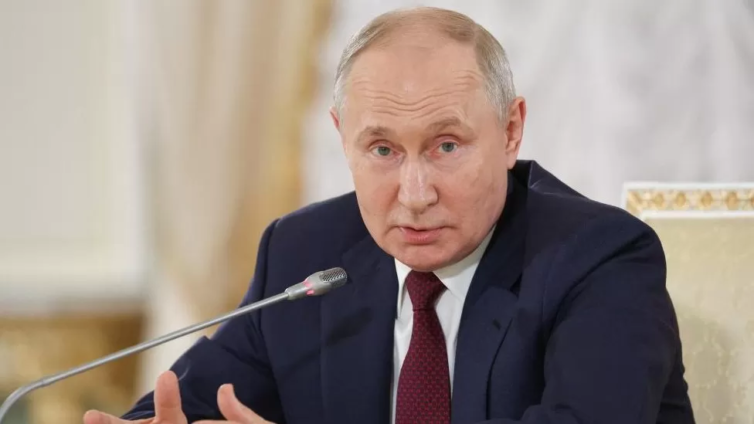
Audio By Carbonatix
Vladimir Putin says Russia would consider an attack from a non-nuclear state that was backed by a nuclear-armed one to be a "joint attack", in what could be construed as a threat to use nuclear weapons in the war in Ukraine.
In key remarks on Wednesday night, the Russian president said his government was considering changing the rules and preconditions around which Russia would use its nuclear arsenal.
Ukraine is a non-nuclear state that receives military support from the US and other nuclear-armed countries.
His comments come as Kyiv seeks approval to use long-range Western missiles against military sites in Russia.
Ukraine's President Volodymyr Zelensky has travelled to the US this week and is due to meet US President Joe Biden in Washington on Thursday, where Kyiv's request is expected to be top of the agenda.
Ukraine has pushed into Russian territory this year and wants to target bases inside Russia which it says are sending missiles into Ukraine.
Responding to Putin's remarks, Zelensky's chief of staff Andriy Yermak said Russia "no longer has anything other than nuclear blackmail to intimidate the world".
Putin has threatened the use of nuclear weapons before. Ukraine has criticised it as "nuclear sabre-rattling" to deter its allies from providing further support.
Russian ally China has also called for calm, with reports President Xi Jinping has warned Putin against using nuclear arms.
But on Wednesday, after a meeting with his Security Council, Putin announced the proposed radical expansion.
A new nuclear doctrine would "clearly set the conditions for Russia to transition to using nuclear weapons," he warned - and said such scenarios included conventional missile strikes against Moscow.
He said that Russia would consider such a "possibility" of using nuclear weapons if it detected the start of a massive launch of missiles, aircraft and drones into its territory, which presented a "critical threat" to the country's sovereignty.
He added: "It is proposed that aggression against Russia by any non-nuclear state, but with the participation or support of a nuclear state, be considered as their joint attack on the Russian Federation."
The country's nuclear arms were "the most important guarantee of security of our state and its citizens", the Kremlin leader said.
Since the end of World War Two, nuclear-armed states have engaged in a policy of deterrence, which is based on the idea that if warring states were to launch major nuclear strikes it would lead to mutually assured destruction.
But there are also tactical nuclear weapons which are smaller warheads designed to destroy targets without widespread radioactive fallout.
In June, Putin delivered a warning to European countries supporting Ukraine, saying Russia had “many more [tactical nuclear weapons] than there are on the European continent, even if the United States brings theirs over.”
“Europe does not have a developed [early warning system],” he added. “In this sense they are more or less defenceless.”
At the time he had hinted of changes to Russia's nuclear doctrine - the document which sets out the conditions under which Moscow would use nuclear weapons.
Latest Stories
-
Elsie Addo Awadzi: Leadership reflections, one year on: 7 lessons from seven years in public office
1 minute -
Finance Minister announces expiration of DDEP-induced restrictions on domestic bond issuance
14 minutes -
Gov’t urged to aid private nursing training colleges to ease burden on public ones
19 minutes -
Kumasi Mayor vows to keep Kejetia Market free from highly inflammable materials
27 minutes -
Ghana safe from fuel supply disruptions amid Middle East tensions – Dr Oppong
29 minutes -
Ghana Development Awards 2026 set to celebrate excellence in nation-building and economic recovery
1 hour -
IMANI opens applications for 12th SYPALA summer seminar
1 hour -
Khamenei’s wife dies after suffering injuries in air strike – Iranian media
2 hours -
Modernising customs operations: Leveraging advanced technology to combat fraud and inefficiencies
2 hours -
Accra Professional Ladies Open returns after three-year hiatus to mark International Women’s Day
2 hours -
Savannah police command lauds Yagbonwura and others for sustaining current peace
2 hours -
SONA crafted to set up President Mahama – Economist
2 hours -
Gov’t losing focus over cedi appreciation – Economist
2 hours -
March 6 declared statutory public holiday for Independence Day
2 hours -
GCB Bank PLC reaffirms commitment to Ghana–China trade at Chinese New Year climax in Accra
2 hours

